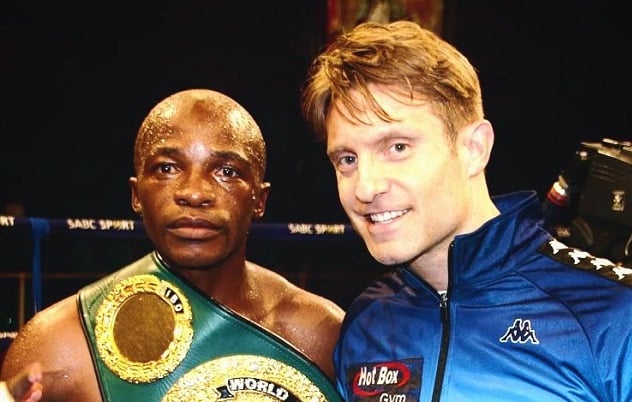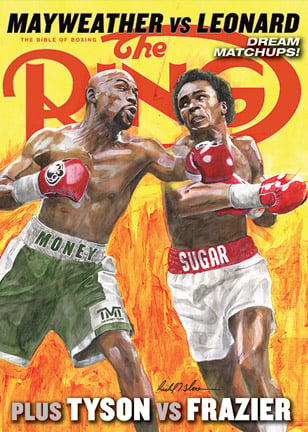Moruti Mthalane – Always the patient warrior and once again a champion

If Moruti Mthalane is in any doubts as to what should be his ring walk song for his next fight, Redemption Song by Bob Marley might be a good choice. The South African is once again the IBF flyweight champion, more than five years after losing the title without throwing a punch, and he has certainly seen the highs and the lows of the game.
His nickname of “Baby Face” somehow doesn’t seem appropriate for a 35-year-old fighter. He is just over two weeks removed from his title winning effort against Muhammad Waseem at the time of our sit down and amazingly, the marks of that tough battle seem long gone. He laughs when I tell him that he can actually still pull off his nickname. He is definitely one of those people where age is just a number on paper.
Yes, the second time round at the top of the mountain is definitely better than the first time. “It took such a long time to get a chance to fight again for this title. I thought that it may never happen,” he tells me with a look of relief on his face.
For him, boxing started at the age of 13 when he followed his older brother to the gym. He had a relatively undistinguished amateur career, representing his regional team, winning some and losing others. He turned pro in 2000 and was trained by that same brother, Thokozani, for his first four fights, thereafter joining the very successful stable of the late Nic DuRandt. Mthalane racked up 14 straight wins which landed him a shot at the South African flyweight championship, held by Nkqubela Gwazela.
He was well in command until he was stopped in the 10th round. His first loss still vexes him today. “I fought well for 10 rounds, then he caught me with a punch and the referee stopped the fight. I didn’t even go down.”

Moruti Mthalane and his trainer Colin Nathan. Photo credit: Brian Wysoke
Mthalane persevered and two years later he was back challenging for the South African title. This time he left no doubt and knocked out Akhona Aliva in six rounds. After three defences of his South African title, with an international fight sandwiched in between, he went 12 rounds for the first time, outpointing Hussein Hussein, who previously gave Jorge Arce a very tough fight.
That led to his first big break, a shot at the IBF flyweight title held by the then formidable Nonito Donaire. He was not overawed by the occasion and approached it with a deep-seated belief in his ability. “I was excited to get the opportunity. I trained hard for it, as always,” said Mthalane, who faced Donaire in 2008. Unfortunately, it was not to be. The fight was just warming up when he sustained a cut in the sixth round and the referee stopped it. “I still believe the referee stopped it too early. I was in tears because it was my first opportunity to win a world title. I believe I would have won if the referee hadn’t stopped the fight.” He still thinks highly of his one-time nemesis. Though, and believes that the participants of the WBSS bantamweight tournament would be foolish to write him off. “He is not very big. Featherweight was too heavy for him. He can still make bantamweight,” he opines.
Just like his pursuit for the national title, his quest for a world title was successful the second time around when he outpointed future WBO titleholder Julio Cesar Miranda for the vacant IBF belt in November 2009. For the next three years he went on a run of note, making four successful defenses. Countryman and future two-weight world champion Zolani Tete was first, Mthalane dispatching him in five rounds. He then took the same amount of rounds to get rid of another future two-weight world champion, John Riel Casimero before going on the road. He defended his title in Italy, stopping Andrea Sarritzu in seven rounds. Impressive as some of those victories were, he insists there were no walkovers. “When you get to the world level, there are no easy fights,” Mthalane explains with habitual respect towards his opponents.
Nowhere was that respect more evident than when he made the fourth defence of his title under hostile conditions in Panama. He had to get off the canvass twice before stopping Ricardo Nunez in the eighth round of an entertaining shootout. When questioned on what made that fight so tough, he thinks for a moment and gives his take. “I think they sat down and prepared really well for me,” said the champion. “He caught me, but I just kept fighting back and eventually he ran out of gas.”
Then disaster struck, but not in the form of a referee’s 10-count. Mthalane was scheduled to make a mandatory defence against Thailand’s Amnat Ruenroeng, but there was no local promoter willing to promote the fight and it went to purse bids. The winning bid was such a paltry amount that it would barely cover expenses to fight the awkward Thai, in Germany of all places. He, together with manager/trainer Nic DuRandt, decided to vacate the title and explore other avenues.
He was left in the boxing wilderness and that decision led to a year and a half’s worth of inactivity before he got a chance to fight again in 2014 against the tough Filipino Jether Oliva. He won on points but didn’t look like himself. “I didn’t fight well. I think I over trained. My mind wasn’t right,” he admits. Two more wins followed, then he hit another bump in the road. Boxing in South Africa wasn’t exactly thriving and Durandt, who produced champions in assembly line fashion for most of his career, decided to retire from boxing in 2016. I asked him what he thought was the secret of Durandt’s amazing success. His answer is simple. “Hard work and discipline.” It didn’t help him, though, as that led to more inactivity and he sat out the entire 2016.
Mthalane freely admits that he considered packing it in, but then he decided to join trainer/manager, Colin Nathan, at the Hot Box Gym in Glenhazel, Johannesburg. “I came to Hot Box because as a fan, I watch fights on TV and I could see that the guys from his gym always looked good and were winning.” When questioned about the differences between Durandt and Nathan, he shrugs. “They’re a little bit different in training style but what I like about Colin is that he didn’t try and change my fighting style.”

Mthalane with former trainer, the late Nick Durandt.
The new partnership racked up three stoppage wins before he finally got a chance to fight for his old title again, this time against former Pakistani amateur star, Muhammad Waseem, on the undercard of the Pacquiao-Matthysse fight in Kuala Lumpur, Malaysia, in July of this year.
Nothing was left to chance. “The game plan for Waseem was to throw more jabs because he doesn’t move his head and drops the right hand. Then I followed up with combinations. He tried to catch me in the body, but we had a plan for that.” Mthalane got off to a terrific start; peppering Waseem with punches in bunches. “Waseem gave me a good fight,” he continues, “he didn’t run.” That suited him as he is a fighter who prefers to stay in the pocket.
It was far from easy, though. Waseem fought back hard over the second half and the action ebbed and flowed until Waseem scored a flash knockdown with a short left at the end of the 11th round when he suddenly stepped over into a southpaw stance. “I made the mistake of mixing too much with him and he caught me,” Mthalane admits. He survived, however and his early dominance and grit over the stretch got him a deserved win by unanimous decision and a new IBF belt.
When probed about the future, Mthalane hasn’t got anyone in particular in mind, he is just happy to be a world champion again. He does however mention that he wants to stay busy and hopes to make a voluntary defence before the year is out.
The new champion is considered old for a flyweight but he has no plans of calling it quits just yet. “I know I am no longer young but when I check the history of the sport, there are lots of guys my age and older who have done very well. I still feel and train the same as I always had.” Amazingly, in this era of division hopping, he has stayed at flyweight his entire career. Once again, there is no real secret. “Discipline,” being his predictable answer.
South Africa has produced some fine fighters in the flyweight division. There was Jake Tuli; who had a successful international career back in the 1950’s, WBA champion, Peter Mathebula and WBO titleholder “Baby Jake” Matlala. Mthalane may never achieve the popularity and celebrity that Matlala did but he may very well be the best flyweight that his country has produced.
Now, together with Ring and WBA junior flyweight champion Hekkie Budler and WBO bantamweight boss Zolani Tete, he is leading a resurgence in South African boxing. Heck, add Isaac Dogboe and make it African boxing, for that matter.
I ask him for a few words of wisdom for the up-and-comers and he obliges: “First of all, boxing is good and you can have a good life through boxing. Secondly, you must be serious and disciplined; not just inside the ring but outside as well. Then, dreams do come true.”
Words to live by.
Struggling to locate a copy of THE RING Magazine? Try here or
Subscribe
You can order the current issue, which is on newsstands, or back issues from our subscribe page.















